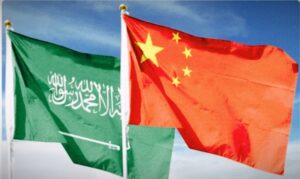Map The Expanding Global Influence of China
China’s rapid rise as a global powerhouse has reshaped international relations and trade networks, affecting every corner of the world. As the world’s second-largest economy and a leader in industries like electronics, manufacturing, and artificial intelligence, China’s influence extends far beyond its borders. Learning Mandarin, the official language of China, offers a gateway into this influential culture and economy.
Chinese is also the most widely spoken language globally, with over a billion native speakers. As China’s economic influence expands, learning Mandarin equips individuals to engage effectively in a world where China plays a central role in commerce, finance, and technology.
Strategic Importance for Saudi Arabia and Arab Countries
Saudi Arabia and other Arab nations have recognized the growing importance of Mandarin. In 2019, Saudi Arabia officially added Mandarin Chinese to its educational curriculum, underscoring its commitment to building stronger cultural and economic ties with China. This decision aligns with Saudi Arabia’s Vision 2030, which seeks to diversify its economy and reduce dependency on oil by engaging with emerging economies like China.
Chinese language instruction in Saudi schools provides students with direct access to educational and business opportunities that align with the country’s shifting economic ambitions. Furthermore, as China remains a significant investor in Saudi Arabia’s infrastructure, energy, and technological sectors, learning Mandarin opens doors for Saudis to work within these key partnerships. This dynamic also applies across the Gulf region, where countries like the UAE have initiated Mandarin programs in schools to foster stronger bilateral relationships with China.
African Nations Embracing Chinese Language Education
African countries, too, have embraced the strategic value of Mandarin education. As China’s Belt and Road Initiative (BRI) builds infrastructure and trade routes across Africa, local governments and educational institutions recognize that Mandarin fluency enhances employment prospects and strengthens business ties.
In countries such as Kenya, South Africa, and Ethiopia, Confucius Institutes have established Chinese language programs to meet the rising demand. African students learning Chinese are better positioned to work with Chinese companies, which invest heavily in African energy, agriculture, and manufacturing. Proficiency in Mandarin opens a direct channel to opportunities in these sectors, fostering mutual understanding and more effective partnerships.
For example, Ethiopia has introduced Mandarin as a core subject in schools, which enables Ethiopian youth to become a bridge between the country and Chinese business interests. This access proves mutually beneficial, as Africans with Mandarin skills become instrumental in negotiations, project management, and cross-cultural communication.
Pakistan’s Integration of Chinese in Education
Pakistan, a long-time strategic partner of China, has also prioritized Mandarin learning. With initiatives like the China-Pakistan Economic Corridor (CPEC) boosting infrastructure, energy, and transport in Pakistan, language has emerged as a bridge for cooperation. Pakistani universities now offer Mandarin courses, and schools are integrating Chinese language instruction, preparing the younger generation to participate actively in this collaboration.
For Pakistan, Mandarin fluency offers significant employment advantages. As Chinese companies establish a stronger presence in Pakistan, locals who are proficient in Mandarin are well-positioned for roles in management, translation, and trade. Additionally, Pakistani students with Mandarin skills often find scholarship opportunities in Chinese universities, gaining advanced education and technical skills that they can bring back to their home country.
Why Mandarin Complements English
While English remains a dominant global language, learning Chinese has distinct advantages in navigating the world’s evolving power dynamics. English has traditionally opened doors to Western business and culture, but as China’s influence rises, Mandarin provides essential access to the opportunities in Asia and, increasingly, Africa, Latin America, and the Middle East.
For students and professionals alike, being bilingual in English and Mandarin is increasingly seen as a competitive edge. Multinational companies with interests in both the West and China prefer employees who can navigate these two spheres seamlessly, allowing businesses to connect with broader markets.
Unlocking Opportunities Through Language
Mastering Chinese isn’t just about language proficiency; it’s a pathway to understanding Chinese culture, philosophies, and business practices. China’s negotiation style, deeply rooted in concepts of “Guanxi” (relationships) and “Mianzi” (face), contrasts sharply with Western approaches. Learning Mandarin offers a nuanced understanding of these practices, essential for building long-lasting partnerships.
Moreover, with Chinese companies like Huawei, Alibaba, and TikTok impacting global technology, finance, and media, knowing Mandarin enables closer connections and understanding of innovations shaping the future. Whether in diplomacy, technology, or trade, Mandarin language skills facilitate collaboration with these influential entities.
Mandarin Chinese as a 21st-Century Essential
As more countries recognize Mandarin’s importance, individuals who master both English and Mandarin are positioned to thrive. Saudi Arabia, Africa, Pakistan, and other regions have taken strategic steps to integrate Chinese language education, showcasing a global acknowledgment of China’s pivotal role in shaping tomorrow. Learning Mandarin is no longer optional for those looking to participate fully in a world where China’s influence will continue to grow. By equipping new generations with Mandarin skills, countries are not only preparing for a future of economic engagement but also fostering deeper cross-cultural understanding in an increasingly interconnected world.


